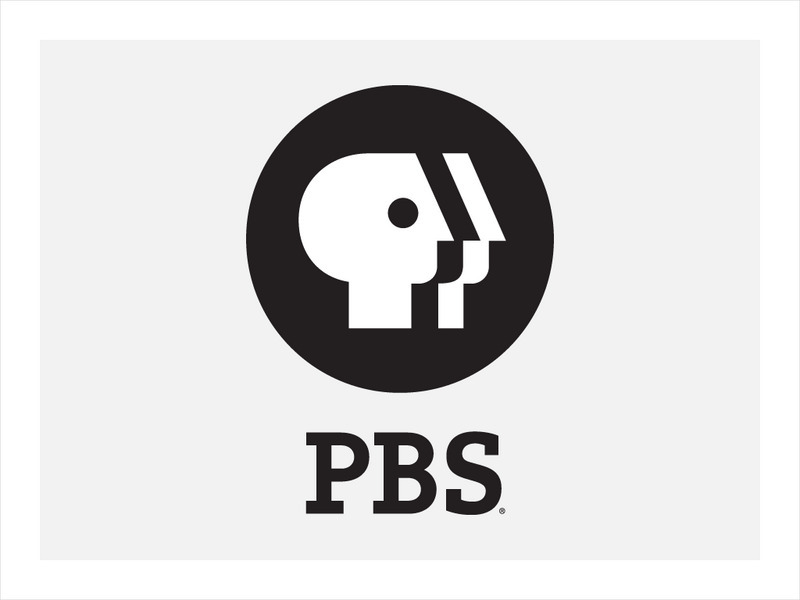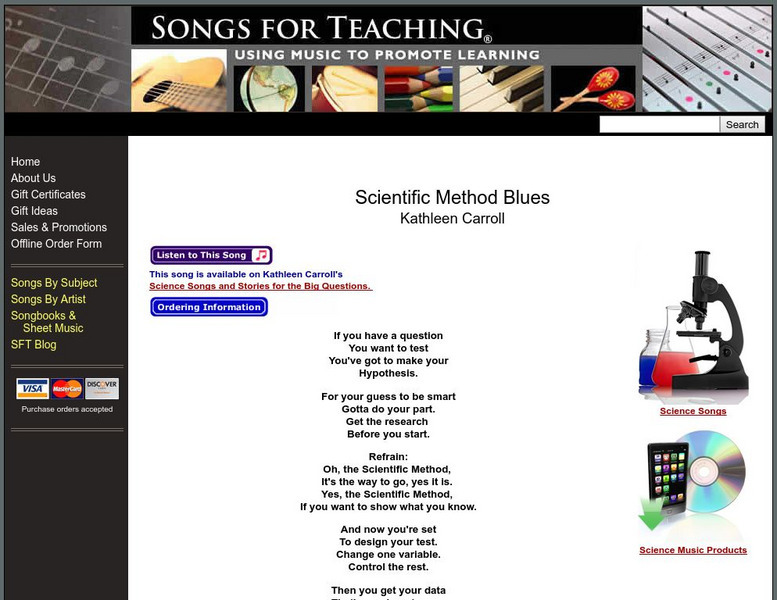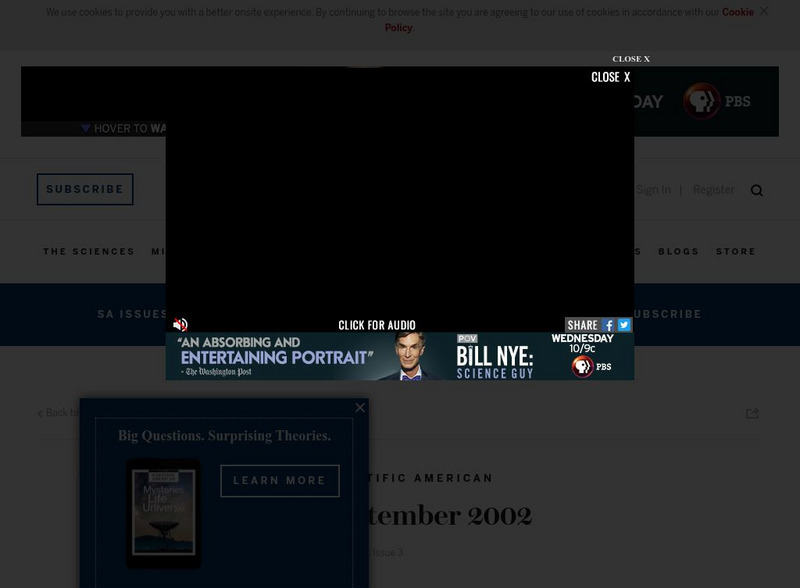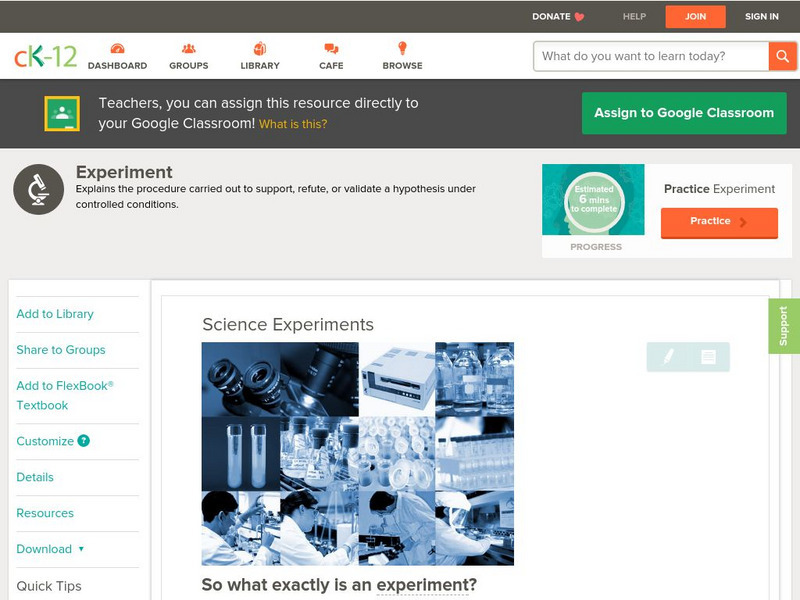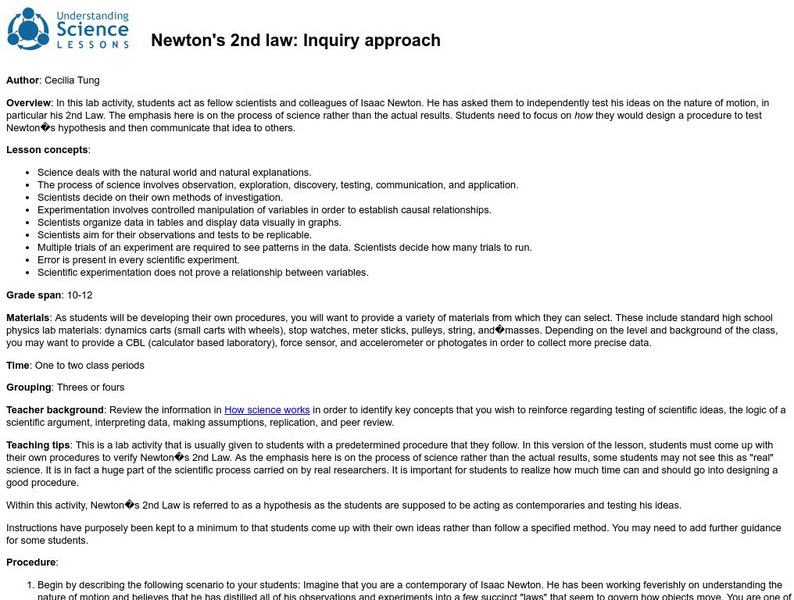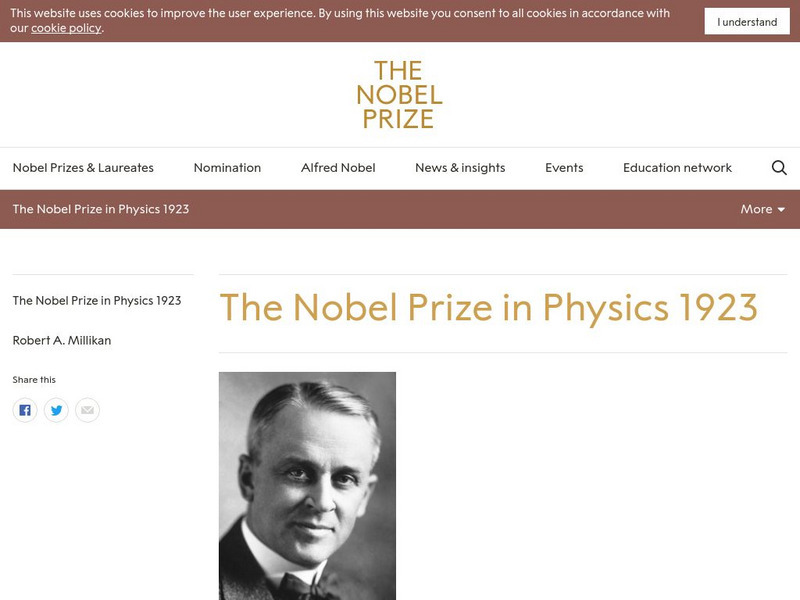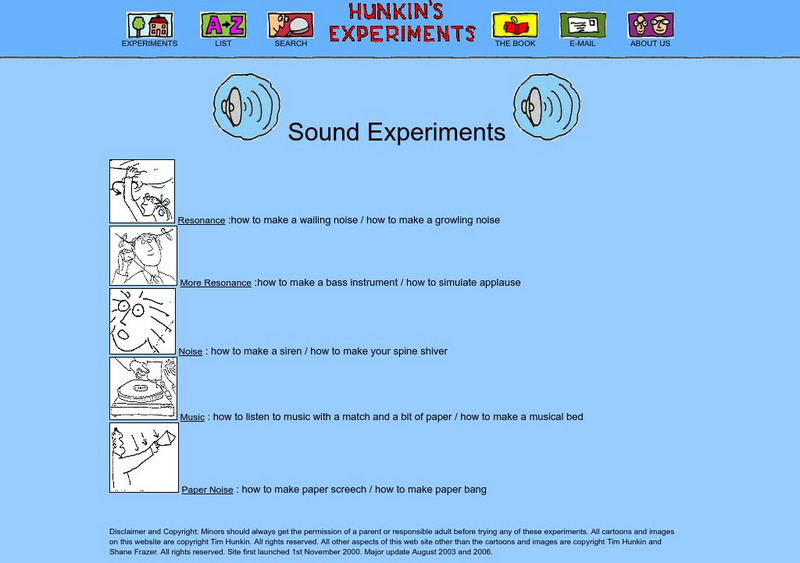Iowa State University
Iowa State University: Argument for Scientific Realism
This page from Iowa State University describes the various experimental ways that Avogadro's number has been determined.
PBS
Pbs Teachers: Scientific American: Fat and Happy?: Counting Calories
Explore the concept of the calorie. Determine the calories/gram of the burned food by measuring its mass, and make conclusions about the experimental design.
Songs for Teaching
Songs for Teaching: Scientific Method Blues
This lesson introduces the scientific method to your students through song. Students will learn the steps of the scientific method through this great song written by Kathleen Carroll. Click on the link and play it for your whole class.
BioMan Biology
Bio Man Biology: Inky the Squid and the Treasures of the Scientific Method!
Review your understanding of the scientific method as you play this underwater game. Collect clues in bottles, pearls, and answer questions. There are three levels of difficulty to choose from.
National Center for Ecological Analysis and Synthesis, University of California Santa Barbara
Nceas: Scientific Method
This concise site from NCEAS contains an explanation of the scientific method along with a basic example of the scientific method in action.
Quia
Quia: Nature of Science Scientific Method Concentration
Play a game of concentration by matching terms used in the scientific method to their proper description.
Scientific American
Scientific American: Smart People Believe Weird Things
This article, published by Scientific American (September 2002), explores how smart people can believe weird and silly things. The article comes to the conclusion that our beliefs are shaped more by our environment than our understanding...
Science Education Resource Center at Carleton College
Serc: Plant Pest Control
The goal of this learning experience is to familiarize learners with the concept of scientific inquiry, hypothesis formation, experimental design, data analysis, and interpretation. Students will explore the website "Which Pest Control...
CK-12 Foundation
Ck 12: Biology: Science Experiments
[Free Registration/Login may be required to access all resource tools.] Introduction to scientific experiments.
University of California
Understanding Science: Newton's 2nd Law: Inquiry Approach Lesson
For this lesson, students develop their own scientific experiment to test Newton's hypothesis that the acceleration of an object depends on the net force acting upon it and its mass. After completing their designed experiment, students...
Vision Learning
Visionlearning: Atomic Theory: Wave Particle Duality and the Electron
An explanation of advanced atomic theory based on developed concepts from earlier scientific experimentation.
Texas Education Agency
Texas Gateway: Types of Science Investigations
This tutorial will describe the three types of scientific investigations: descriptive, comparative, and experimental.
TeachEngineering
Teach Engineering: Heave Ho!
Students will discover the scientific basis for the use of inclined planes. They will explore, using a spring scale, a bag of rocks and an inclined plane, how dragging objects up a slope is easier than lifting them straight up into the...
Nobel Media AB
The Nobel Prize: The Nobel Prize in Physics 1923: Robert Andrews Millikan
This Nobel website on the life and scientific work of Robert A. Millikan includes a biography, images, and internet resources for further reading and research. Also included are the 1923 "Presentation Speech" which praised Millikan's...
Vision Learning
Visionlearning: Practice of Science: Introduction to Research Methods
An explanation indicating that there is more than one method of scientific research.
Vision Learning
Visionlearning: Data: Uncertainty, Error, and Confidence
An explanation of how errors may affect data that has been collected for experimentation. Some examples are given.
Other
The Hastings Center: Ethics of Medical Research With Animals
A collection of articles from a variety of experts with differing points of view on the subject of using animals for scientific research. Beyond these nine articles, the site provides links to many additional studies on the subject,...
Nobel Media AB
The Nobel Prize: Thomas Hunt Morgan and His Legacy
This detailed article from the Nobel e-Museum explores Thomas Hunt Morgan's career and research in genetics. Read how Morgan's work influenced later scientists and the modern scientific world.
University Corporation for Atmospheric Research
Ucar: Elementary Globe: Earth System in a Bottle
If you have seeds at home, try this activity to help kids learn what a seed needs to grow. Students will create experimental conditions in terrariums to study what plants need to live. They will learn about the importance of the...
Hunkins Experiments
Hunkin's Experiments
Hunkin's Experiments is a group of simple cartoon illustrations of scientific principles. Some would work well in the classroom, but others have little value beyond entertaining students. All of the projects are easy to do and use...
Hunkins Experiments
Hunkin's Experiments: Ink
Hunkin's Experiments is a group of simple cartoon illustrations of scientific principles. Some would work well in the classroom, but others have little value beyond entertaining students. All of the projects are easy to do. This one is a...
Hunkins Experiments
Hunkin's Experiments: Sound Experiments
Hunkin's Experiments is a group of simple cartoon illustrations of scientific principles. Some would work well in the classroom, but others have little value beyond entertaining students. All of the projects are easy to do. This group of...
TeachEngineering
Teach Engineering: Students as Scientists
This curricular unit contains two lessons that let students actually do the work of scientists as they design their own experiments to answer questions they generate. In the first lesson and its associated activity, students conduct a...
Science Struck
Science Struck: What Is Experimenter Bias and How to Avoid It?
When doing research, it is important to be aware of one's biases and how to prevent them impacting on the design of an experiment or analysis of a research topic. Learn some techniques used to avoid bias in an experiment.



